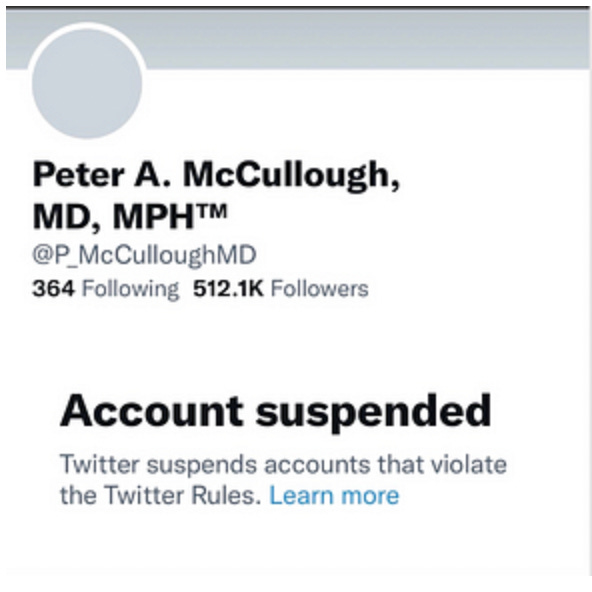"Quis custodiet ipsos custodes? - Who will watch the watchers?"
The New American Censorship: Banning, Cancelling, and Stealing
“Did you ever hear anyone say ‘That work had better be banned because I might read it and it might be very dangerous to me?’”—Joseph Henry Jackson, American critic, travel-writer (1894-1955)
“These days no one holds the written word in such high esteem as police states do.”—Italo Calvino, Italian novelist (1923–1985)
“Give me the liberty to know, to utter, and to argue freely according to conscience, above all liberties.” —John Milton, English statesman and poet (1608-1674)
On October 7, 2022, Dr. Peter McCullough was suspended from Twitter, and all his carefully cited scientific posts were consigned to oblivion. Without warning or explanation, Twitter determined that a leading internist and cardiologist—one with decades of clinical experience and the most published author in his field (Cardiorenal Medicine)—would no longer be allowed to communicate with his 512,000 followers.
Dr. McCullough’s final tweet featured a video produced by the Vaccine Safety Research Foundation titled Are the Kids OK? The video included footage of his testimony under oath before the Pennsylvania Senate in which he referenced a case study by Gill et al. of two teenage boys who died on days three and four after receiving the Pfizer COVID-19 shots. Gill et al. are not alone in documenting myocarditis in young men. The Florida Department of Health just completed a study in which it found an 84% increase in the relative incidence of cardiac-related death among males 18-29 years of age within 28 days following mRNA vaccination. When Florida Surgeon General, Dr. Joseph Ladapo, tweeted a reference to this study, Twitter deleted it and then suspended him from the platform. Only after Tucker Carlson drew attention to this bizarre incident in an interview with Dr. Ladapo did Twitter reinstate the Surgeon General’s account.
For most of U.S. history, censorship was only considered a legitimate action for suppressing obscenity and incitements of violence and crime. During times of war, many accepted that censorship was necessary for maintaining the secrecy of military operations. Now it is commonplace for any utterance about a range of scientific, social, and political topics to be censored on the grounds that it is“misinformation” or a violation of “community standards.” The censors offer no definitions of “misinformation” or “community standards.” Their assertions imply that the censored party is challenging an orthodoxy established by an official authority. But how exactly was the orthodoxy established, and what exactly are the credentials of its guardians? Regarding novel phenomena such as COVID-19, how was it determined that the heads of federal health agencies possessed greater knowledge of the infectious disease than doctors in the field who treated the sick?
The tension between central authority and independent thinkers is an ancient one that is probably rooted in our age-old tendency to seek religious and metaphysical explanations for the human condition. The so-called Scientific Revolution in how humans thought about the world did not eliminate the conflict between orthodoxy and heresy. During the early days of the pandemic, it often occurred to me that NIAID chief, Dr. Anthony Fauci, availed himself of something akin to Papal Infallibility. He reminded me of notable popes during the Counter-Reformation, when church orthodoxy was challenged by priests such as Martin Luther and scientists such as Galileo. Luther was declared a heretic and outlaw; Galileo was tried and convicted of heresy and spent the last nine years of his life under house arrest.
The English statesman and poet, John Milton, visited Galileo in the summer of 1633, shortly after his trial. It was a moving experience that influenced Milton’s famous defense of free speech that he published in a 1644 pamphlet titled Areopagitica. In this speech he described censors as “oligarchs” who “bring a famine upon our minds.”
Until recently, most Americans strongly associated censorship with the police states of the Soviet Union, Nazi Germany, and other totalitarian dictatorships. While the comparison with these regimes may seem hyperbolic to those who haven’t yet run afoul of the censors, it’s important to bear in mind that full-blown tyranny typically doesn’t emerge all at once, but through a step by step process. The tyrant begins with censorship. Over time, much of the citizenry grows accustomed to it and largely accepts it. However, for those who continue to speak out, the tyrant imposes additional penalties. The dissenting voice is banned from the public forum, then he is subjected to fines, taxes, and other limitations on his ability to make a living. Finally, if the dissenter persists in speaking out, he is arrested and perhaps even put to death. As the German poet Heinrich Heine (1797-1856) put it, “Wherever they burn books they will also, in the end, burn human beings.”




